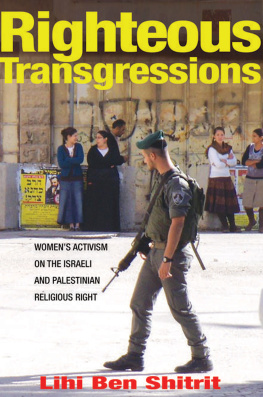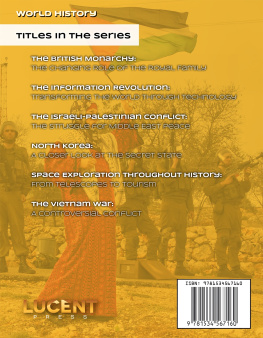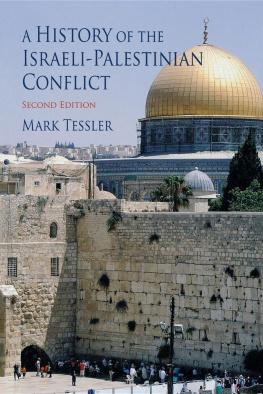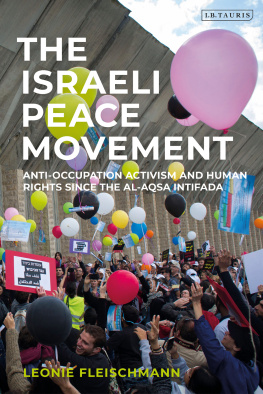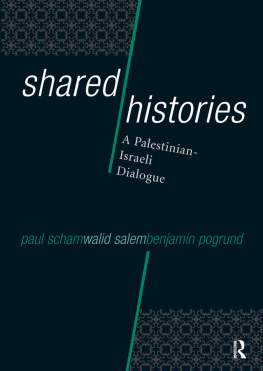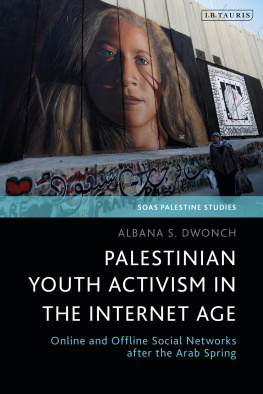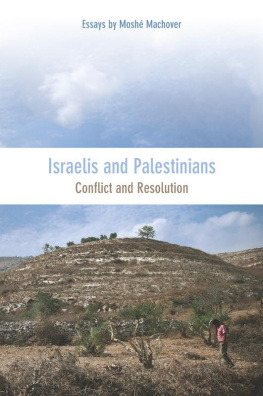Copyright 2016 by Princeton University Press
Requests for permission to reproduce material from this work should be sent to Permissions, Princeton University Press Published by Princeton University Press, 41 William Street, Princeton, New Jersey 08540 In the United Kingdom: Princeton University Press, 6 Oxford Street, Woodstock, Oxfordshire OX20 1TW
press.princeton.edu
All Rights Reserved
Library of Congress Cataloging-in-Publication Data
Ben Shitrit, Lihi, 1981
Righteous transgressions : womens activism on the Israeli and Palestinian religious right / Lihi Ben Shitrit.
pages cm. (Princeton studies in muslim politics)
Includes bibliographical references and index.
ISBN 978-0-691-16456-4 (hardcover : alk. paper) ISBN 978-0-691-16457-1 (pbk. : alk. paper) 1. WomenPolitical activityIsrael. 2. WomenPolitical activityWest Bank. 3. WomenPolitical activityGaza Strip. 4. Religious rightIsrael. 5. Religious rightWest Bank. 6. Religious rightGaza strip. 7. Judaism and politicsIsrael. 8. Islam and politicsIsrael. 9. Islam and politicsWest Bank. 10. Islam and politicsGaza Strip. I. Title.
HQ1236.5.I75B46 2016
320.08205694dc23 2015019622
British Library Cataloging-in-Publication Data is available
Publication of this book has been made possible in part by a grant of the Israel Institute, Washington, DC.
Women, Freedom, and Agency in Religious Political Movements, originally published in The Journal of Middle East Womens Studies, Volume no. 9:3, pp. 81107. Copyright, 2013, Association for Middle East Womens Studies.
All rights reserved. Republished by permission of the copyright holder, and the original publisher, Duke University Press. www.dukeupress.edu
This book has been composed in Linux Libertine O
Printed on acid-free paper.
Printed in the United States of America
1 3 5 7 9 10 8 6 4 2
Acknowledgments
M any people and institutions supported this project over the years since I began working on it in earnest in 2007. I should first mention the financial support without which the fieldwork, and deskwork, for this book would not have been possible. I received generous grants from Yales MacMillan Center (2008) and the Social Science Research Councils International Dissertation Research Fellowship (20092010). A year spent as a Colorado Scholar at Harvards Womens Studies in Religion Program (WSRP) was instrumental for completing my writing, and the Israel Institute in Washington, DC, offered a much needed subvention grant to help make this manuscript into a book. A part of was previously published in Politics & Gender (2015) in my article Authenticating Representation: Womens Quotas and Islamist Parties.
My dissertation adviser, Ellen Lust, accompanied the project from the start and provided invaluable guidance, advice, and confidence; I am enormously grateful to her. I also want to thank Elisabeth Jean Wood for reading earlier versions of this manuscript, for offering insightful suggestions, and for pointing me in the right directions. In addition, Adria Lawrence and Tariq Thachil gave important comments on an earlier version of this work, which I have incorporated in the book. Regina Bateson, Madhavi Devasher, Calvert Jones, Jonah Schulhofer-Wohl, Matthew Longo, and Corinna Jentzsch commented on parts of this work at Yale and also made my graduate school experience much more pleasant than I had expected it would be. At Harvard Divinity School (HDS), Ann Braude was instrumental in kickstarting the work of adaptation from dissertation to book, and Tracy Wall provided much needed help and the relief of conversations about things other than work. My WSRP colleagues Sarah Bracke, Jacquelyn Williamson, Amanda Izzo, Hsiao-wen Cheng, Zilka Spahi iljak, and Judith Casselberry provided a year of intellectual excitement and nurturing. I would also like to thank Leila Ahmed and Sara Roy at Harvard, whose work has been inspirational. The students in the graduate seminar I taught at HDS in the fall of 2013 also helped me think through several of the themes addressed in this book.
Parts of this manuscript have been presented in numerous forums, and I thank participants for their engaged feedback. In particular, I want to mention the Project on Middle East Political Science (POMEPS) and Marc Lynch, who organized the Junior Scholar Book Development Workshop in October 2014. I received incredibly useful comments from participants, and especially from Jillian Schewdler, Lisa Wedeen, and Sultan Tepe. Mahmoud Jaraba at the Friedrich-Alexander University of Erlangen-Nuremberg has also been a wonderful colleague and co-author, and provided the most insightful conversations on Palestinian politics. Many others provided intellectual engagement, research facilitation, or warm hospitality: Maryam Abu-Raqeeq and her family, Mona al-Habnen and her family, Shaykh Ibrahim Sarsour, Shaykh Safwat Fredge, Shaheen Sarsour, Shoshi Greenfeld, Emily Amrusy, Etiya Zar, Rab-banit Yafa Yom Tov, Anwar Ben-Badis, and Marilyn Friedes. I am indebted to the many women activists and leaders in the movements that I study who opened their homes, workplaces, activities, and stories to me and made this research possible. I hope that they will find this work interesting and useful. I also hope that this book will help highlight their incredible contribution to their movements organizational, political, and religious work and vision.
My colleagues at the School of Public and International Affairs at the University of Georgia, and particularly Cas Mudde and Maryann Gallagher, as well as my undergraduate and graduate students here, created a wonderful environment in which to make the final revisions for this manuscript. Colleagues at my previous work place, the Public Diplomacy department at the US Embassy in Tel Aviv, were also very supportive when I was researching, writing, and trying to do my job there at the same time. At Princeton University Press, I would like to thank my editor Fred Appel for expert handling of the work and for making the process much less painful than it could otherwise have been. Juliana Fidler, Jennifer Harris, and Leslie Grundfest were also tremendously helpful in guiding me through this process. I would also like to thank the two anonymous reviewers of the manuscript, whose suggestions greatly improved the final version of the book.
Finally, I want to thank my familyDeganit, Haim, Eshchar, Yahav, and Ruth Ben Shitrit; Albert Ben Shitrit; Yaeli Avraham and Hillel Baneth; Adina and Israel Flascher; Inbal Franco; and Orit Valencyfor their continued love and support and for giving me a home to escape to from the emotional challenges of fieldwork. I also want to thank my parents-in-law, Gulshan and Sharat Sikri, for their love and support. Most of all, I am grateful to my husband, Rohan Sikri, who always knows when its time for me to stop reading and start writing. His generosity with his brilliance, talent, and love is the reason I was able to write this book.

